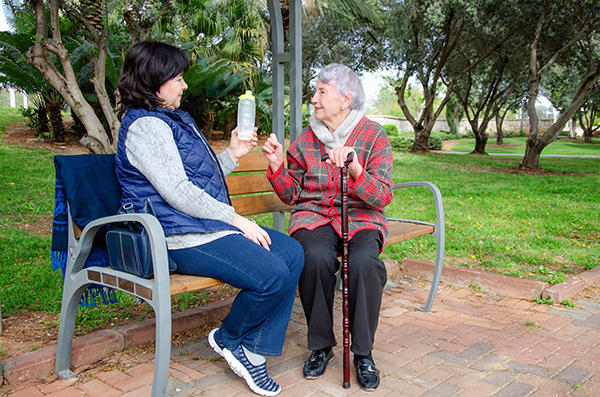While there are particular commonalities, Alzheimer’s disease affects every person uniquely. Our highly trained dementia caregivers know, for instance, that even though one person may find pleasure in being outdoors, another could possibly be overwhelmed by so much sensory input and prefer a quieter indoor environment. One may prefer a morning bath routine, while a dose of resourcefulness is important to help another maintain good hygiene.
We also understand that there are particular triggers that could often worsen Alzheimer’s symptoms. Family care providers should always be especially careful in order to avoid the following:
- Dehydration. Those with dementia may not be in a position to identify when they are thirsty, or may reject offered fluids. It’s crucial to ensure proper hydration to prevent added confusion and weakness. Plain water is best, but if refused, try flavored waters, as well as various kinds of cups or bottles.
- Isolation. Individuals diagnosed with dementia suffer from loneliness as much as anyone else, and without having adequate social stimulation, could become increasingly agitated or paranoid. A specialist care provider, like those at Amy’s Helping Hands, who are thoroughly trained in dementia care, can provide suitable socialization, giving members of the family a much-needed break from care.
- Sugar. It’s common for many with Alzheimer’s disease to experience an increased craving for cookies, cake, and other sugary snacks; however, it may also result in greater irritability. Try offering a number of healthier choices, such as fruit, yogurt, or sugar-free treats.
- Sleeping pills. With the challenges of common sleep issues such as sundowning, it can be tempting for family members to supply sleeping pills to a loved one with Alzheimer’s to promote a more restful night. However, these pills raise the risk for falls and other injuries and contribute to confusion and fogginess. Consult with the senior’s health care provider for an all-natural sleep-inducing alternative.
- TV. Be mindful of what is on television; shows that contain criminal activity or violence, as well as the nightly news, can instill fear and paranoia in individuals with dementia. It might be best to leave the television off and engage your senior loved one in alternate activities, including games, puzzles, reading together, exercising, and reminiscing – or choose to watch movies you’ve very carefully reviewed to make sure content is appropriate.
Each member of our dementia caregiving team is professionally trained and experienced in providing person-centered, compassionate care to effectively manage the issues inherent with Alzheimer’s, and to boost wellbeing. Reach out to our Windsor-Essex home care experts at 519.915.4370 for additional dementia care tips, and for an in-home consultation to learn how Amy’s Helping Hands’ specialized in-home Alzheimer’s care can make life brighter for your loved one.















